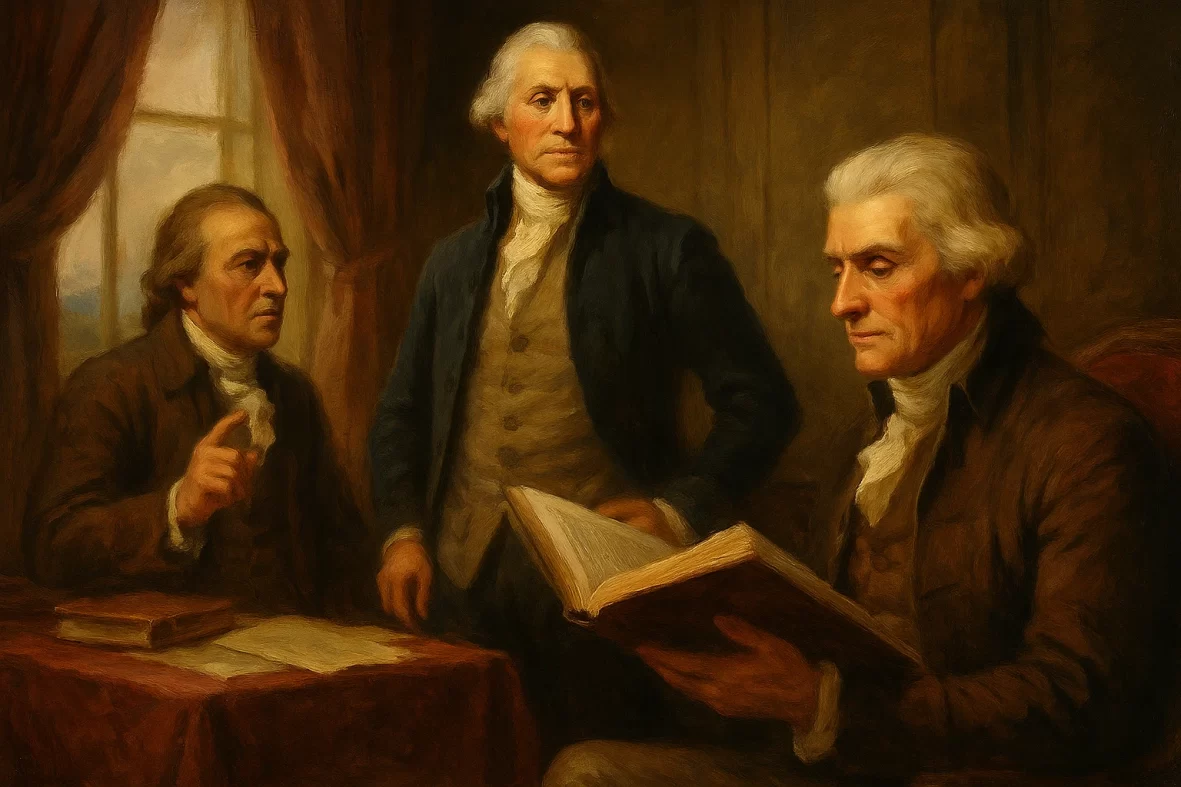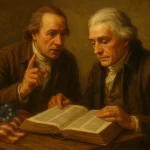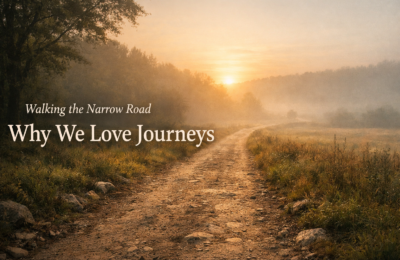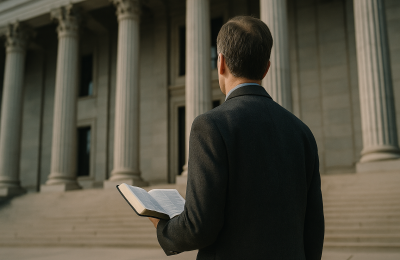Part 1 of the series: Faith and the Founding: A Theological Engagement with America’s Origins
Rebellion to Tyrants, Obedience to God – A Revolutionary Scene
On a warm Philadelphia evening in 1776, three American patriots huddled around a table, sketching grand ideas for a new nation’s Great Seal. One of them – Benjamin Franklin – proposed a dramatic image: Moses standing on the shore of the Red Sea, his hand outstretched as towering waves crash down upon Pharaoh’s chariots . Franklin’s design included a bold motto encircling the scene: “Rebellion to Tyrants is Obedience to God.” Thomas Jefferson loved the phrase so much he later engraved it on his personal seal . Though Congress ultimately chose a different design (the familiar eagle and unfinished pyramid), Franklin’s biblical vision offers a vivid window into the founding generation’s mindset. The American revolutionaries saw their struggle through a biblical lens – a new Exodus from tyranny, guided by Providence’s hand. This raises a fascinating question: How biblical was the American Founding?
That question has sparked fierce debate. On one side, some Christians enthusiastically claim the United States was founded as a “Christian nation” in a literal sense – even that the Constitution was modeled on Scripture or that the founders intended to establish a theocracy. On the other side, many secular critics insist the founding was a wholly Enlightenment affair – driven by deist philosophies and rationalist ideals, with religious faith playing at best a negligible role. Both of these extreme narratives contain a mix of fact and fiction. The true story of faith in America’s founding is far richer and more nuanced. It’s a tale of a people steeped in Scripture, yet adamant about liberty of conscience; of political discourse suffused with biblical language, yet a constitutional order without an official religion.
In this pastoral essay, we’ll explore that story. We’ll step into the meetinghouses and pamphlet shops of the late 18th century to see how the Bible influenced the Revolution and the new republic. We’ll draw on the work of scholars like Donald S. Lutz, Daniel L. Dreisbach, Mark David Hall, and Ellis Sandoz – who have studied the founding era’s writings and sermons – to separate myth from reality. Along the way, we’ll encounter patriot preachers thundering from pulpits, founding fathers quoting Deuteronomy and Proverbs, and ordinary citizens for whom Scripture was the shared language of liberty. The goal is to invite both Christians and skeptics into a deeper appreciation of the complexity – and providential contours – of America’s political origins.
The Bible: The Founding Era’s Most-Quoted Source
One of the most eye-opening findings about the American founding era comes from political scientist Donald S. Lutz. In a famous study, Lutz (1984) surveyed some 15,000 documents of American political commentary published between 1760 and 1805 – the pamphlets, sermons, newspaper articles and treatises in which the Founders articulated the principles of a free government. He wanted to know which sources the American writers quoted most often. The results were striking. The Bible was cited more frequently than any European Enlightenment writer or classical source . In fact, Lutz found that approximately one-third of all the citations in these political writings were from the Bible (Lutz, 1984) . By comparison, the most-cited secular authors (like Montesquieu, Blackstone, and Locke) each accounted for only a single-digit percentage of citations.
To put it plainly, the Bible was the single most influential source of political ideas in the late 18th-century American discourse (Lutz, 1984; Lutz, 1988). This empirical fact may surprise those who assume Enlightenment philosophers were the sole intellectual engine of the Revolution. While thinkers like John Locke and Baron de Montesquieu certainly mattered, they were outpaced by Scripture. Lutz’s research, later summarized in his book The Origins of American Constitutionalism (1988), even identified which biblical texts were most popular. The book of Deuteronomy – Moses’ ancient covenantal sermon to Israel – was the most frequently cited work of all . Deuteronomy appeared in political writings nearly twice as often as the works of John Locke, and more often than Montesquieu’s Spirit of the Laws, which was the leading secular source. The New Testament was not far behind; for example, Lutz notes that the Apostle Paul (whose teachings include Romans 13 on civil authority) was referenced about as frequently as Montesquieu or William Blackstone, the eminent English jurist.
What do these facts tell us? At the very least, they reveal that late 18th-century Americans were deeply familiar with the Bible and comfortable using it in public arguments. The Founders and their contemporaries constantly drew upon Scripture to frame their political ideas. This doesn’t mean they were establishing a church-state fusion (we’ll address that myth soon), but it does mean that biblical language and concepts saturated the political culture. As Professor Daniel L. Dreisbach observes, the Bible functioned as the “lingua franca of the late 1700s,” the most authoritative, accessible, and familiar literary text in America . Revolutionary-era Americans, by and large, knew the Bible by heart – its stories, phrases, and principles flowed from their tongues as they debated liberty, rights, and governance (Dreisbach, 2011). The frequent references to Scripture in speeches and publications “reveal as much about the Bible’s place in the hearts and minds of [the] audiences as about the speakers themselves,” Dreisbach notes . In other words, political leaders quoted Scripture because they knew their listeners would understand it and be moved by it. The Bible was a common cultural currency, a source of shared values and analogies in a way that is hard to imagine in today’s pluralistic America.
It’s also important to note who was doing much of this biblical quoting. Lutz found that a significant portion of the Bible citations came from the era’s most popular political literature: sermons reprinted as pamphlets (Lutz, 1984) . In fact, roughly three-quarters of all biblical citations in the 1760–1805 sample were from clergy sermons that had been published for mass readership . This points to the pivotal role of the “political pulpit” in the American founding. Colonial and Revolutionary-era clergy saw the defense of liberty and virtue as an extension of their ministry. They preached about everything from unjust taxation to the proper design of government, all grounded in Scripture. These sermons were eagerly read and circulated far beyond Sunday mornings. By one estimate, upwards of 80% of the political pamphlets published in the pivotal years of the 1770s and 1780s were actually sermons in pamphlet form . The pulpit was thus not only a sacred desk but a political platform – one of the most influential of the period.
Scripture in the Public Square: How the Bible Shaped Revolutionary Discourse
What did it look like to have Scripture so intertwined with public discourse? It meant that biblical narratives, principles, and phrases furnished the moral vocabulary of the Revolution and early Republic. Far from being confined to private devotion, the Bible was quoted in town meetings, Continental Congress proclamations, political essays, and even in heated tavern debates. The use of Scripture ranged from lofty theological reasoning to the simplest rhetorical flourish. Let’s explore a few key examples and themes:
1. A New Exodus – The Patriot Identity as Israel: Franklin’s Great Seal proposal was no anomaly. The Exodus story of Israel’s deliverance from Pharaoh’s bondage was a favorite analogy for American patriots. Preachers and pamphleteers frequently cast King George III as a Pharaoh and the American people as God’s chosen nation escaping slavery in Egypt. This was not mere propaganda; many Patriots sincerely believed, as one sermon put it, that “the God of the Bible is on the side of liberty.” They drew parallels between the plagues that pressured Pharaoh and the hardships befalling Britain, or between Moses leading his people and George Washington leading the Continental Army. Such parallels gave the colonists’ cause a profound sense of purpose and destiny under God. It also imposed a moral weight: if America was a new Israel, she must uphold the covenantal responsibilities that come with divine favor. The book of Deuteronomyloomed large because it recounts Moses reminding the Israelites of God’s law and the blessings and curses tied to their obedience. Patriot preachers often warned that, like ancient Israel, the new nation would prosper only if it remained virtuous and true to God’s standards. Deuteronomy’s themes of covenant, law, and national righteousness were directly applied to America’s situation. For instance, calls for “public days of fasting and prayer” during the war drew on the Old Testament pattern of national repentance (as in the Book of Joel or Jonah). Even after independence, the idea that Americans had entered a covenant under God – to form a just, free, and moral society – was a recurring motif in political rhetoric.
2. “Providence” and Proverbial Wisdom in Statecraft: The founders, including those less outwardly religious, frequently spoke of Providence – their term for God’s guiding hand in human affairs. General Washington, for example, wrote of the “favorable interpositions of Providence” in the war, and the Continental Congress recommended thanksgivings to Almighty God for victories. This was more than generic deism; it reflected a biblically-informed worldview that God governs in the affairs of men (as Franklin himself admonished during the Constitutional Convention, paraphrasing Scripture: “Except the Lord build the house, they labor in vain that build it” – a direct quote from Psalm 127:1). Beyond narratives, the Bible’s wisdom literature also found its way into political commentary. The book of Proverbs, for example, was mined for timeless insights on leadership and justice. One popular proverb, often cited by Revolutionary writers, was “Righteousness exalts a nation, but sin is a reproach to any people” (Proverbs 14:34). Patriots like Samuel Adams echoed this verse to argue that public virtue was essential to liberty – that only a virtuous people could be truly free. Another favorite was Proverbs 29:2: “When the righteous are in authority, the people rejoice: but when the wicked rule, the people groan.” Such scriptures were used to stoke resolve against “wicked rulers” (seen as Britain’s ministers or King), and to inspire the design of governments that would keep power in check. Even the structure of American constitutions – with separated powers and checks and balances – was sometimes defended by invoking biblical principles about the fallibility of human nature (Jeremiah 17:9’s warning of the heart’s deceit, for instance) and the wisdom of distributing authority (as Jethro advised Moses in Exodus 18:21 to appoint lower officials rather than centralizing power). In short, the Bible provided a repertoire of principles and maxims by which Americans interpreted political events and crafted institutions.
3. Romans 13 and the Question of Obedience to Authority: No scriptural debate was more intense for 18th-century Americans than the one over Romans 13. In that chapter, the Apostle Paul instructs Christians to “be subject to the governing authorities, for there is no authority except that which God has established” (Romans 13:1). How could rebels justify armed revolution against their king in light of this text? This dilemma was tackled head-on by Patriot preachers in what became a critical development of American political theology. Influential ministers like Jonathan Mayhew of Boston (in 1750) and Samuel West of Massachusetts (in 1776) delivered famous sermons reinterpreting Romans 13. They argued that Paul’s injunction was not a blank check for tyranny. Rather, they said, God ordains lawful magistrates to do good – and when a ruler betrays the basic purpose of government (to uphold justice and protect the people’s rights), he effectively loses the mandate of heaven. West explained that “the same principles which oblige us to submit to government do equally oblige us to resist tyranny” – because tyranny is the antithesis of godly authority (West, 1776, as cited in Hyneman & Lutz, 1983). Patriots thus flipped the script: resisting a tyrant could be obedience to God, a sentiment perfectly captured by Franklin’s proposed motto. Loyalist preachers, of course, took the opposite view, quoting Romans 13 as an absolute: they saw the revolution as a rebellion against God’s order. But the Patriot clergy found support in other biblical precedents – from the Hebrew midwives disobeying Pharaoh’s unjust commands (Exodus 1:17), to Peter and John telling the Sanhedrin, “We must obey God rather than men” (Acts 5:29). By weaving these scriptures together, they made the case that freedom from tyranny was a godly cause and that one could fight for independence in good conscience under Scripture. This theological justification was crucial in a society that took the Bible seriously; it helped large numbers of Americans, even many clergymen, rally to the Revolution as a righteous endeavor rather than a sinful revolt.
In all these ways – narrative, moral philosophy, and theological justification – the Bible provided the idioms and imaginative framework for America’s founding generation. They saw themselves as inhabiting a story scripted by Providence, akin to ancient Israel’s, and they sought guidance and legitimation from Scripture at every turn. Not every Founder was an orthodox Christian, to be sure, but virtually all were steeped in the Bible’s content from childhood. Even deists and skeptics employed biblical allusions because it lent moral weight and familiar context to their words. When Thomas Paine, a religious skeptic, wrote Common Sense (1776) to urge independence, he surprisingly devoted pages to denouncing monarchy by citing the Bible (for example, he argued from 1 Samuel 8 that God opposed the Israelites’ desire for a king) – effectively turning his pamphlet into what one historian called “a political sermon” . This is a powerful illustration that the Bible’s influence was cultural as much as theological. It was simply the book everyone knew, the highest authority many people recognized, and thus the ultimate source to appeal to when arguing one’s case in the public sphere.
Between Myth and Reality: Christian Nation or Secular State?
Given the pervasive biblical influence we’ve seen, it’s easy to understand why many Christians today believe the United States had a “biblical founding.” There is truth in that belief – but it can morph into myths if we’re not careful. Let’s address a couple of common misconceptions on both ends of the spectrum:
Myth #1: The Founders Intended to Establish a Theocracy or Biblical Law as National Law. This claim usually comes from well-meaning Christians eager to champion America’s religious heritage. Yes, the founding generation was largely religious, and yes, biblical principles deeply informed their worldview. But did they set up a government directly based on the Bible, or intend to establish a Christian theocracy? The historical record says no. The U.S. Constitution, drafted in 1787, is a decidedly secular framework in its legal form. It never mentions “Bible,” “Christianity,” or even “God” (except a generic reference to “the Year of our Lord” in the date). The First Amendment forbids the establishment of an official religion. This was a conscious choice by the founders, who believed that faith should be voluntary and that civil government should not coerce religious conformity. As political scientist Mark David Hall summarizes: America’s Founding was not “Christian” in the sense of creating a theocracy, but it was deeply shaped by Christian moral and social ideas (Hall, 2011) . In other words, biblical values influenced the ethos – ideals like justice, equality (all are created equal under God), liberty of conscience, and the sinfulness of human pride – but the structures of government were grounded in Enlightenment-informed concepts of natural rights and Montesquieu’s separation of powers more than in any specific biblical blueprint.
Donald Lutz’s research reinforces this point. When Lutz zoomed in on the debates specifically surrounding the Constitution (1787–88), he found that direct biblical citations virtually disappeared . During the Constitutional Convention and the subsequent Federalist/Anti-Federalist debates over ratification, Enlightenment and classical references were far more prevalent. In fact, Lutz notes that Federalists (supporters of the Constitution) did not cite the Bible at all in their published arguments in 1787–88, while even the Anti-Federalists (opponents of the Constitution) referred to Scripture in only about 9% of their citations . Why the drop-off? Lutz explains that when designing concrete institutions – the mechanics of federalism, bicameral legislatures, executive power, etc. – the Bible had “little to say” on those technical issues . The Federalists leaned on political science and pragmatic reasoning (“Enlightenment rationalism”) and apparently felt the Bible wasn’t directly relevant to questions like how to proportion representation in Congress or empower the President . The Anti-Federalists did try to invoke some basic biblical principles of government (for example, warning that the Constitution lacked explicit Christian underpinning or sufficient moral safeguards), but even they mostly argued on grounds of history and rights. In short, when it came to actually framing the nation’s supreme law, the founders did not sit down with the book of Deuteronomy to draft articles. They separated biblical moral insight from the nuts and bolts of governance. This underscores that the Founders, devout as many were, did not establish a government indistinguishable from a biblical covenant nation (like ancient Israel). They founded a constitutional republic – one that presupposed moral self-government among the people, to be sure, but that deliberately avoided entangling church and state in the manner of the Old World. Any suggestion that U.S. civil law was lifted wholesale from Mosaic law is fiction. Indeed, early state and federal codes did not, for example, mandate Sabbath observance or tithe payments or other distinctly biblical ordinances. The Founders respected biblical ethics, but they also embraced religious liberty and the idea that legitimate government arises from the consent of the governed – principles compatible with Christianity, though not exclusively drawn from chapter-and-verse.
Myth #2: The Founders Were Secular Deists Who Wanted Religion Out of Public Life. On the other side, a prevalent modern narrative (especially in some academic circles over past decades) is that the leading Founders were deists at best – men of the Enlightenment who privately dismissed Christianity and designed a strictly secular polity where faith was marginalized. This too is a distortion. While a few notable figures like Thomas Paine were vocally anti-Christian, they were outliers. The majority of the Founding Fathers were, in fact, professing Christians of various denominations – and even those with unorthodox theology (such as Thomas Jefferson or Benjamin Franklin) consistently affirmed the societal importance of religion and morality. George Washington, John Adams, James Madison, Patrick Henry, John Jay, Samuel Adams – these and many others were churchgoers who spoke openly about Providence and inculcated biblical morality as the bedrock of civic virtue. They did not intend to create a secular vacuum in public life. Quite the opposite: they routinely encouraged religious influence as a positive force for the republic’s health. For example, Congress in 1776 appointed chaplains and in 1782 endorsed the distribution of Bibles. Washington’s Farewell Address (1796) famously warned that “religion and morality” are “indispensable supports” of political prosperity. Such statements were not anomalies; they reflected a consensus that biblical morality was crucial for sustaining republican government. Even the much-invoked principle of “separation of church and state” (a phrase from Jefferson’s 1802 letter) was meant to assure freedom of worship, not to purge religious language or values from the public square.
Modern scholarship has been revising the older secular narrative. Historian Mark David Hall notes abundant evidence that “America’s Founders were influenced in significant ways by Christian ideas” and that these ideas informed their political thought (Hall, 2019). They believed in a higher law of right and wrong (often identified with the Creator or Scripture) that should inform civil law. They drew heavily on the Christian natural law tradition (stemming from thinkers like Locke, who himself cited the Bible frequently) which taught that our rights come from God, and on the Hebraic republican tradition that emphasized covenant and moral order. This doesn’t mean every Founder was orthodox (Jefferson, for instance, had heterodox views of Jesus, and Franklin was genial but theologically vague), but even these men used Christian thought strategically. For example, Franklin in the Constitutional Convention – arguably the most Enlightenment-leaning gathering – implored the delegates to pray together, citing biblical precedent, because “God governs in the affairs of men” and without His aid, their efforts would fail. Such an episode is hardly the behavior of strict secularists or deists who think God is uninvolved. Instead, it reveals that the prevailing mindset among the founders was that God (in a providential, biblical sense) was very much concerned with the success of their political experiment.
In summary, the American Founding was neither a moment of unalloyed Christian theocracy nor one of wholly secular revolution. It was something uniquely balanced: a product of biblical culture meeting Enlightenment ideas. The founding generation managed to create a government that avoided officially enshrining any denomination or sect, yet they infused that government with values that were, by and large, congruent with a Judeo-Christian worldview. To borrow a phrase from one scholar, it was “a regime with Christian influence, without a Christian establishment.”
Conclusion: Providence and Principle – Lessons from a Scripture-Shaped Founding
So, how biblical was the American Founding? The evidence suggests that it was highly biblical in its political culture and rhetoric, even as it remained cautiously biblical in its formal structures and laws. The founding generation knew their Bibles and earnestly believed that the “God of Heaven” – the God of Scripture – smiled on the cause of liberty. They wove Scripture into their speeches, letters, and laws (think of the Liberty Bell’s inscription of “Proclaim liberty throughout all the land unto all the inhabitants thereof,” a direct quote of Leviticus 25:10, chosen in 1751 and providentially apt for 1776 ). They weren’t shy about invoking Old Testament Israel or the teachings of Jesus to frame their new nation’s values. At the same time, they did not simply copy-paste the Bible into a governmental manual. They showed discernment – drawing from Scripture to inspire and admonish, while also drawing from reason and experience to establish a practical government suitable for a pluralistic society.
For modern Christians, this nuanced legacy is a call to wisdom and humility. It’s inspiring to realize that the Bible helped give birth to American liberty. We can celebrate the fact that biblical principles – the dignity of the individual, the sinfulness of unchecked power, the need for virtue among citizens – are woven into the fabric of our nation’s ideals. The founders’ example encourages believers today to engage in public life with both conviction and charity, speaking the language of faith in a way that appeals to the common good. It’s a reminder that Scripture can still offer insight into perennial political questions: justice, human rights, the moral limits of authority. However, the founding also warns against misusing faith for political ends. The American founders did not impose a theocracy or demand agreement on every point of doctrine; rather, they worked out a system that allows religious freedom for all. Christians should likewise resist the temptation of authoritarianism wrapped in biblical language. The founders’ nuanced approach – Scripture-shaped but not coercive – is a model of how faith can positively influence public life without dominating it.
For skeptics or secular-minded citizens, understanding the biblical strain in the founding can foster a more accurate and appreciative view of our history. It shows that religion in early America was not merely obscurantist or divisive; in fact, it often undergirded the very commitments to liberty and justice that we all hold dear. The biblical ethos of the founding instilled a fervent belief in human equality (grounded in the idea of Imago Dei, that all are created in God’s image) and in human fallibility (hence checks and balances). Even the separation of powers and limited government owe something to a Protestant suspicion of concentrated human authority (given our sinful nature). Thus, while one can certainly champion a secular government, one need not disparage the religious influence that helped shape that government’s best features. The founding era demonstrates that faith and reason need not be enemies – they cooperated in forging a free republic.
In reflecting on the American founding, we find a rich tapestry where Scripture is a vibrant thread. The story defies simplistic categorizations. It wasn’t a “Bible blueprint” for government, but it was a time when Scripture set the moral compass for a people seeking freedom. The founders were keenly aware (in the words of Proverbs) that “by wisdom a house is built” and “by understanding it is established.” They sought wisdom in many sources, yet most deeply from the Book that had guided their forebears. One can view this as a fortunate confluence of historical forces, or as many of the founders did – as part of a providential plan. Either way, the result was a nation conceived in liberty, with an ethos significantly shaped by biblical ideas of justice, virtue, and equality.
As we carry forward that experiment in ordered liberty, we would do well to remember – and learn from – the full complexity of our roots. The American Founding teaches us that a society can be grounded in transcendent truth while honoring freedom of conscience; that one can invoke God’s word in public life not to oppress, but to uplift and unite. It challenges today’s Americans, Christians and skeptics alike, to move beyond caricatures and engage in a richer dialogue about the role of faith in our national story. Perhaps, in doing so, we may recover some of the warmth and wisdom that marked our beginnings – a hope that, in the words of an early congressional prayer, “truth, justice, and charity” would prevail in our land, under the favor of Providence who presides over the destiny of nations.
References :
Dreisbach, D. L. (2011). The Bible in the political rhetoric of the American Founding. Politics and Religion, 4(3), 401–427.
Dreisbach, D. L. (2017, May). The Bible and the American Founders [Lecture transcript]. C.S. Lewis Institute. (Adapted from a talk delivered May 19, 2017).
Hall, M. D. (2011). Did America have a Christian founding? The Heritage Foundation Backgrounder. Retrieved from https://www.heritage.org
Hall, M. D. (2019). Did America have a Christian founding? Separating modern myth from historical truth. Thomas Nelson.
Hyneman, C. S., & Lutz, D. S. (Eds.). (1983). American Political Writing During the Founding Era, 1760–1805 (Vols. 1–2). Indianapolis, IN: Liberty Fund.
Lutz, D. S. (1984). The relative influence of European writers on late eighteenth-century American political thought. American Political Science Review, 78(1), 189–197.
Lutz, D. S. (1988). The Origins of American Constitutionalism. Baton Rouge, LA: Louisiana State University Press.
Moots, G. A. (2021, December 28). Early America’s political pulpit. Law & Liberty. Retrieved from https://lawliberty.org
Sandoz, E. (Ed.). (1998). Political Sermons of the American Founding Era, 1730–1805 (2nd ed.). Indianapolis, IN: Liberty Fund.








